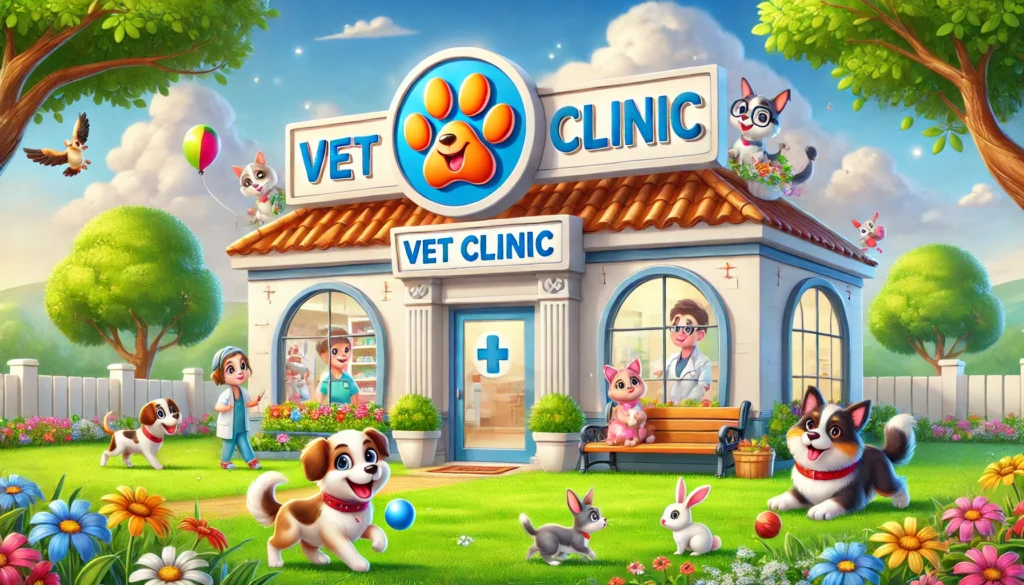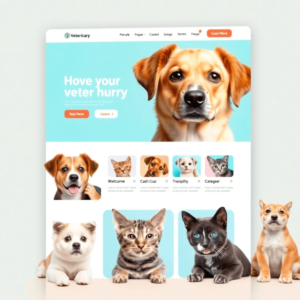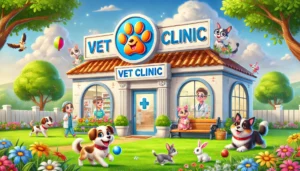Introduction
Veterinary clinics operate in a highly competitive environment where effective marketing is essential for success. Pet owners now have numerous options for veterinary care, making it vital for clinics to establish a strong presence and differentiate themselves.
Key Reasons for Marketing in Veterinary Clinics:
- Attracting New Clients: Engaging marketing strategies can draw in pet owners looking for quality care.
- Retaining Existing Clients: Consistent communication and valuable content keep current clients informed and loyal.
As the landscape of veterinary care continues to evolve, the role of veterinary marketing services becomes increasingly important. These services are designed to help clinics navigate challenges such as:
- Rising competition from low-cost clinics
- The need for an engaging online presence
Investing in veterinary marketing services empowers practices to create tailored strategies that resonate with pet owners, ultimately supporting growth and enhancing client relationships. Embracing these marketing solutions is not just an option; it is a necessity for any clinic aiming to thrive in today’s market.
One of the most effective ways to improve a clinic’s online presence is by leveraging Google My Business. This platform can significantly enhance local visibility, attract more clients, and build a strong online reputation through optimized profiles and leveraged reviews.
Furthermore, implementing a veterinary lead magnet can be an invaluable strategy in attracting potential clients by offering them something of value in exchange for their contact information.
In addition, leveraging paid ads will be crucial in adapting to the changing digital marketing landscape. Effective use of paid advertising can further boost visibility and client acquisition efforts.
Understanding the Challenges Faced by Veterinary Clinics
Veterinary clinics encounter various barriers that impact pet owners’ access to care. Some of these challenges include:
1. Financial Constraints
High costs associated with veterinary services can deter pet owners from seeking necessary care. According to the Access to Veterinary Care Coalition, many pet owners cite affordability as a primary concern.
2. Limited Awareness
Pet owners may not understand the importance of regular veterinary visits, leading to neglect in preventive care.
3. Geographic Barriers
In rural or underserved areas, limited access to veterinary clinics can hinder timely treatment for pets.
The rise of low-cost clinics significantly affects private practices. These establishments often provide basic services at reduced rates, attracting price-sensitive clients. As a result, traditional clinics face increased competition, which may lead to:
- Decreased Client Retention: Pet owners may choose lower-cost options for routine care, impacting long-term relationships with their primary veterinarians.
- Pressure on Service Pricing: To remain competitive, private practices might feel compelled to lower their prices or offer discounts, potentially affecting profitability.
Addressing these challenges requires strategic marketing efforts tailored to communicate value and enhance client engagement effectively.
The Role of Effective Marketing in Overcoming Challenges
Effective marketing plays a crucial role in veterinary care, enabling clinics to distinguish themselves in a crowded marketplace. By implementing targeted veterinary marketing strategies, practices can address common challenges and enhance their visibility among pet owners.
Key benefits include:
- Increased Client Awareness: Tailored marketing efforts inform potential clients about unique services, fostering awareness and encouraging them to choose your clinic over competitors.
- Building Trust and Loyalty: Consistent messaging and personalized communications help establish a strong relationship with existing clients. This trust translates into long-term loyalty and repeat visits.
Investing in veterinary marketing services offers several long-term advantages:
- Sustainable Growth: A well-executed marketing plan can lead to increased client acquisition and retention, which is essential for sustained practice growth.
- Enhanced Online Presence: Utilizing SEO techniques improves search rankings, making it easier for pet owners to find your clinic online.
These strategies not only address immediate challenges but also lay the groundwork for future success. In a competitive environment where choices abound, effective marketing ensures that veterinary clinics remain relevant and appealing to pet owners seeking quality care.
Key Components of a Successful Veterinary Marketing Strategy
Tailoring Strategies to Your Audience
Understanding the unique needs and preferences of pet owners is crucial for veterinary clinics aiming to enhance their market presence. Effective marketing strategies hinge on market segmentation, which allows practices to focus their efforts on specific demographics. This involves:
- Identifying Client Needs: Recognizing the varied requirements of pet owners based on factors such as the type of companion animals they own, their lifestyle, and their budget. For instance, first-time pet owners may require more educational resources about routine care and vaccinations, while seasoned owners might be more interested in advanced services like dental care or behavioral consultations.
- Creating Personalized Messages: Tailored communication resonates more effectively with different audiences. Utilizing targeted messaging can increase engagement significantly. Examples include:
- Families with children may appreciate content that emphasizes pet safety and health.
- Young professionals could respond well to messages highlighting convenience and quick service options.
- Senior pet owners may benefit from information on geriatric care and specialized services.
Investing in client education is another vital component. Providing resources such as newsletters, blog posts, or webinars can position your clinic as a trusted authority in veterinary care. This not only builds loyalty but also encourages clients to refer your services to others.
The digital landscape offers numerous opportunities for enhancing visibility through tailored strategies. Engaging content that addresses common concerns or questions—like nutrition, exercise, or health checks—can lead to higher search rankings, making your clinic more discoverable to potential clients.
Incorporating elements of digital marketing is essential for reaching a broader audience. Strategies such as search engine optimization (SEO), social media campaigns, and email marketing can effectively target specific segments of the market by delivering relevant content directly to pet owners’ inboxes or feeds.
By focusing on understanding client behaviors and delivering personalized experiences, veterinary clinics can transform their marketing efforts into powerful tools for growth. Embracing these key components enables practices to connect genuinely with pet owners, fostering lasting relationships that contribute to sustained success.
Setting a Budget and Measuring Success
Establishing a realistic marketing budget is crucial for veterinary clinics aiming to optimize their outreach. Consider the following steps:
1. Analyze Past Expenses
Review previous marketing expenditures to understand spending patterns.
2. Allocate Funds for Various Channels
Distribute your budget across digital marketing, social media, and client education initiatives.
3. Account for Market Segmentation
Tailor budgets based on identified target demographics to ensure effective resource allocation.
Measuring the success and ROI of marketing strategies involves tracking several key performance indicators (KPIs):
1. Engagement Metrics
Monitor website traffic, social media interactions, and email open rates to gauge client interest.
2. Client Retention Rates
Evaluate how well educational efforts contribute to retaining existing clients, particularly regarding companion animals.
3. Sales Analysis
Assess changes in revenue linked to specific marketing campaigns while considering price sensitivity in veterinary care and willingness to pay (WTP) among pet owners.
By focusing on these areas, clinics can enhance their marketing effectiveness and adapt strategies accordingly.
Enhancing Online Visibility through SEO and Digital Marketing
Developing a Custom Website that Appeals to Pet Owners
Creating a website tailored to the needs of pet owners is crucial for enhancing online visibility. A well-designed custom website serves as the foundation for all digital marketing efforts. Key features include:
- User-Friendly Navigation: Simplified layouts allow pet owners to easily find information about services, appointments, and contact details.
- Mobile Optimization: With many users accessing websites via mobile devices, ensuring your site is responsive enhances user experience and search rankings.
- Fast Loading Times: Quick load times reduce bounce rates, keeping potential clients engaged and increasing the likelihood of appointments.
Engaging content plays an essential role in attracting visitors to your site. Quality content not only provides valuable information but also helps improve search engine optimization (SEO) efforts. The following elements are vital:
- Informative Articles: Publishing well-researched articles on pet care topics can establish your clinic as a trusted authority in veterinary medicine.
- Visual Media: High-quality images and videos showcasing your clinic, staff, and success stories make a lasting impression on visitors.
- Client Testimonials: Positive reviews from satisfied clients enhance credibility and encourage prospective pet owners to choose your services.
The importance of engaging content extends beyond aesthetics. Search engines favor websites that provide relevant, high-quality information. By optimizing content with strategic use of keywords related to veterinary services, clinics can significantly boost their online presence.
Incorporating effective SEO strategies alongside a custom website development approach amplifies visibility in search results. This dual focus allows clinics to target specific demographics through Google Ads campaigns while fostering organic traffic through informative content.
Veterinary clinics that embrace these digital marketing principles stand out in today’s competitive landscape. Establishing a robust online presence not only attracts new clients but also fosters long-term relationships with existing ones, leading to sustained growth for the practice.
Leveraging Social Media and Email Marketing for Client Engagement
Building a strong social media presence enhances client engagement and drives traffic to your practice. Consider these strategies:
1. Platform Selection
Focus on popular platforms like Facebook, Instagram, and Twitter where pet owners frequently interact.
2. Engaging Content
Share informative articles, adorable pet photos, and client testimonials to foster community interaction.
A robust social media strategy for veterinarians not only boosts online visibility but also builds brand loyalty. Regular posts keep your clinic top-of-mind for pet owners. To further enhance your social media marketing efforts, you might want to explore these 5 Social Media Marketing Tips to Boost your Marketing, which can help increase leads from potential customers who are interested in your services.
Effective email marketing strategies play a crucial role in client retention. Implement the following:
- Email Newsletters: Send updates about promotions, services, and educational content to keep clients informed.
- Personalization: Tailor messages based on pet owner preferences and interests to increase open rates and engagement.
Utilizing Google Ads for targeted outreach complements these efforts. By integrating SEO and engaging content into your marketing plan, veterinary clinics can significantly enhance their online presence while connecting with clients effectively. This could involve adopting a comprehensive approach that includes web design and digital marketing campaigns, ensuring that your online presence is not only visually appealing but also effectively optimized for search engines.
Client Relationship Management and Communication Strategies in Veterinary Marketing Services
Personalized communication is a cornerstone of client retention in veterinary practices. Tailoring interactions to meet the unique needs of pet owners fosters loyalty and enhances the overall client experience. Key strategies include:
1. Utilizing Patient Relationship Management Software
This technology, such as the client application offered by some veterinary marketing services, allows clinics to track client interactions, preferences, and pet health records. By leveraging this data, veterinarians can tailor messaging and follow-ups, ensuring relevant and timely communication.
2. Implementing Telemedicine in Veterinary Practice
Telemedicine offers convenience for clients while maintaining strong relationships. Virtual consultations allow for immediate engagement, addressing minor concerns without the need for an office visit. This flexibility not only improves service delivery but also demonstrates a commitment to client care.
The integration of these tools enhances communication and fosters a sense of community among clients. Pet owners appreciate personalized updates on health reminders, vaccination schedules, and wellness checks, which can be automated through marketing services. As practices embrace these strategies, they cultivate deeper connections with their clientele, ultimately driving satisfaction and loyalty.
Promoting Special Offers and Services Effectively with Veterinary Marketing Services
Attracting new clients can be achieved through well-structured promotions and highlighting specific services. Effective strategies include:
1. Special Offers for New Clients
- Launch targeted promotions, such as discounts on initial visits or bundled services, to incentivize pet owners to choose your clinic.
- Utilize social media platforms and email newsletters to spread the word about these offers, reaching a wider audience.
2. Highlighting Specific Services
- Focus on the benefits of specific services in veterinary practice, such as dental care or preventive health checks. Emphasize how these services contribute to pets’ overall well-being.
- Create engaging content that educates pet owners about the importance of regular dental check-ups, showcasing before-and-after photos and testimonials from satisfied clients.
By implementing these strategies, veterinary clinics can effectively attract new clients while educating them on the value of specific services. A proactive approach not only increases foot traffic but also fosters long-term relationships with pet owners who appreciate the comprehensive care their pets receive.
Conclusion: Embrace Veterinary Marketing Services to Grow Your Practice Today!
Veterinary clinics face a competitive landscape that demands effective marketing strategies. Utilizing veterinary marketing services can significantly enhance your visibility, attract new clients, and retain existing ones.
Why Veterinary Clinics Need to Use Veterinary Marketing Services:
- Tailored solutions for unique challenges
- Improved client communication and engagement
- Strategies to promote special offers effectively
Take action today. Book an appointment with avileadgen-pets.com for customized marketing solutions designed to help you grow your practice.
FAQs (Frequently Asked Questions)
Why do veterinary clinics need to use veterinary marketing services?
Veterinary clinics need to use veterinary marketing services to effectively reach and engage pet owners, stand out in a competitive market, and ultimately grow their practice. Effective marketing strategies can help address barriers to veterinary care and enhance the overall client experience.
What are the challenges faced by veterinary clinics in attracting clients?
Veterinary clinics face challenges such as competition from low-cost clinics, barriers to access for pet owners, and the need for effective communication strategies. Understanding these challenges is crucial for developing tailored marketing strategies that resonate with potential clients.
How can effective marketing strategies benefit veterinary clinics?
Effective marketing strategies can help veterinary clinics differentiate themselves in a crowded marketplace, attract new clients, retain existing ones, and promote special offers or services. Investing in these strategies provides long-term benefits that contribute to the growth of the practice.
What key components should be included in a successful veterinary marketing strategy?
A successful veterinary marketing strategy should include market segmentation to understand target audiences, client education initiatives, digital marketing efforts such as SEO and social media engagement, and personalized messaging tailored to different demographics of pet owners.
How can social media and email marketing enhance client engagement for veterinary practices?
Building a strong social media presence allows veterinary practices to engage with clients effectively through updates and promotions. Additionally, utilizing email newsletters keeps clients informed about services, offers, and educational content, fostering stronger relationships with pet owners.
What role does client relationship management play in veterinary marketing?
Client relationship management is essential in veterinary marketing as it focuses on personalized communication that enhances client retention. Tools like patient relationship management software and telemedicine can improve service delivery and foster deeper connections between veterinarians and pet owners.








